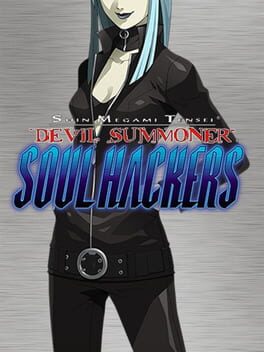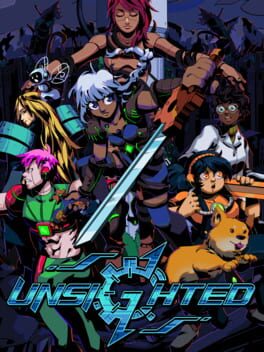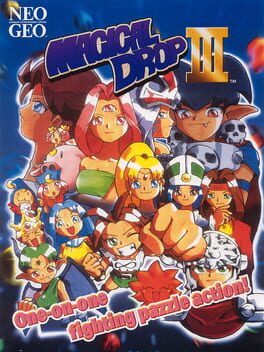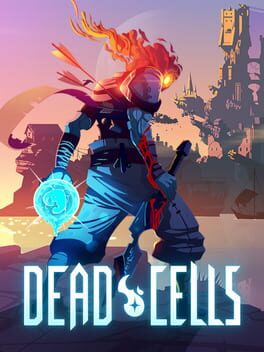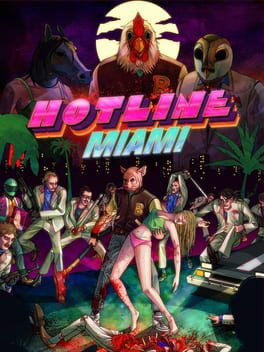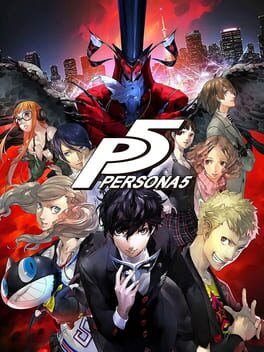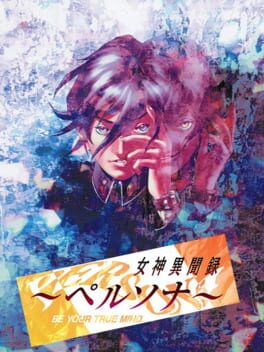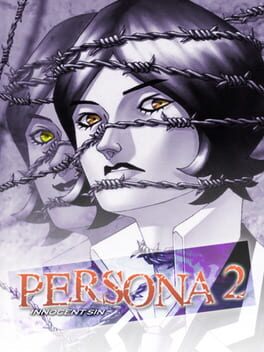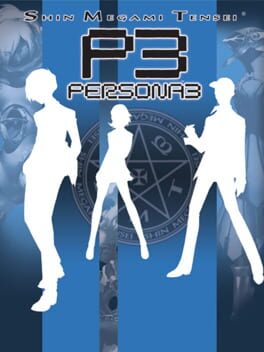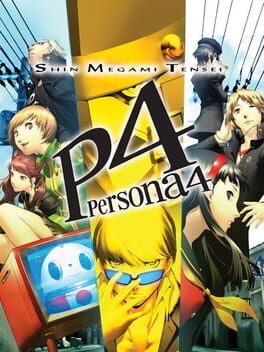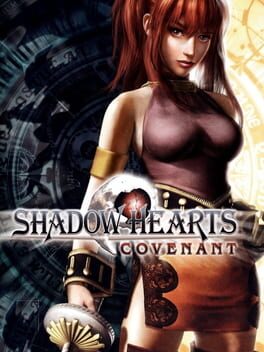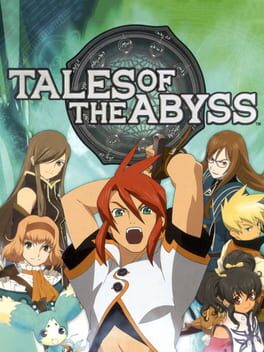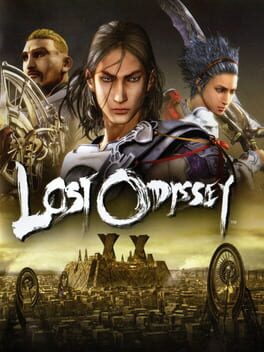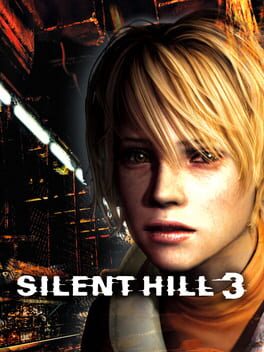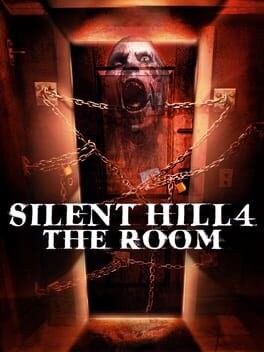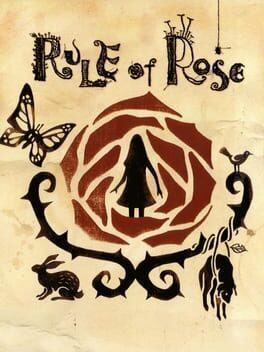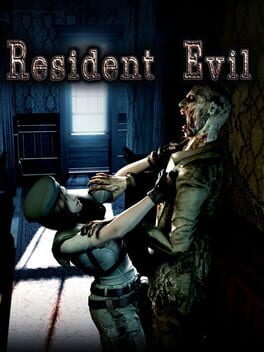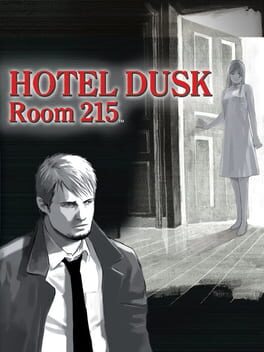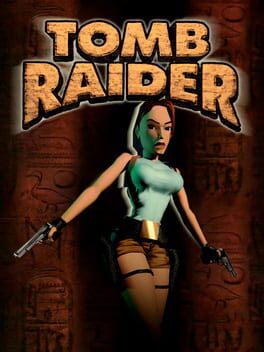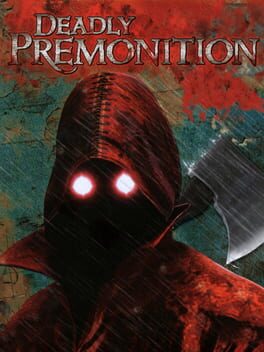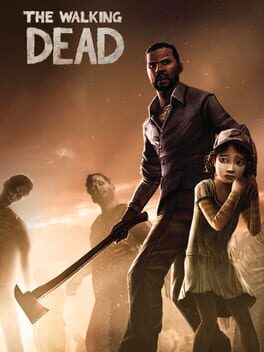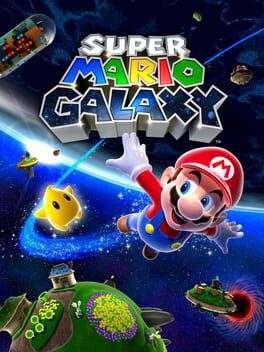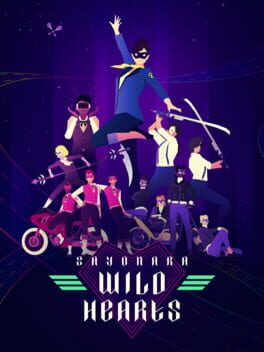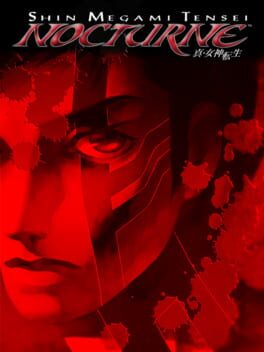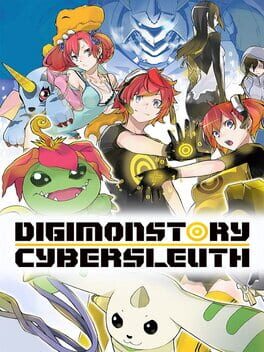newtontlod
BACKER
153 reviews liked by newtontlod
A decent game with a great retro futurist aesthetic that has never really clicked with me. I've gotten roughly halfway through this 3 times now before getting bored and dropping it, which always surprises me because I love nearly all of the mainline entries that precede this.
Demon loyalty sounds good on paper as it helps personify your demons a bit but I'm generally not a fan of how it actually plays out during battles, especially when combined with the clunky row system which further limits your demon's actions; it ends up just making battles feel needlessly elongated and tedious compared to earlier games in the series. The story is serviceable, if not a little bland, though I'm sure it felt more original back when it was released. I also don't really understand the common love for Nemissa (outside of her cool character design) as I genuinely find it a little off-putting how often she forces Hitomi into uncomfortable situations which the game then plays off as a gag.
Demon loyalty sounds good on paper as it helps personify your demons a bit but I'm generally not a fan of how it actually plays out during battles, especially when combined with the clunky row system which further limits your demon's actions; it ends up just making battles feel needlessly elongated and tedious compared to earlier games in the series. The story is serviceable, if not a little bland, though I'm sure it felt more original back when it was released. I also don't really understand the common love for Nemissa (outside of her cool character design) as I genuinely find it a little off-putting how often she forces Hitomi into uncomfortable situations which the game then plays off as a gag.
Hollow Knight
2017
Much like Outer Wilds, it took me a few tries for me to really appreciate this game. And, as much as I don't care for how the internet compares every new metroidvania to this game, Hollow Knight is a masterpiece in this genre.
I distinctly recall when I played this game originally, that I didn't particularly care for fumbling around blindly in a new area searching for Cornifer for the map. After this playthrough, I think I still feel this way. I feel that the new Prince of Persia really took a good middle ground between giving the player a base outline for the area and purchasing the map filling in the area. With that being said, the way Hollow Knight approaches exploration did lead to cool discoveries and harrowing moments of stress...I still don't particularly care for how much this game relies on hidden walls though.
Combined with the exploration is a combat / traversal system that really expands that further you get into the game. With the combined efforts of a wealth of permanent upgrades and now-very-famous charm system, the complexity of the combat really shines in the late-game and optional high difficulty content. Hollow Knight also contain a variety of bosses that are often thrilling to fight against. You can expect some duds in there with the number that they have (Relying on throwing-garbage-all-over-the-screen attacks or periods where you cannot damage the boss)...but the quality of the majority of the bosses, especially the story-related ones, are second to none.
Speaking of the narrative, it is very opaque and obtuse. Much like the way the narrative in Dark Souls is told, it relies heavily on context clues and descriptions of abilities and items to provide flavor to the world. However, I found the world to be endlessly engrossing and the narrative cap, especially with the original true ending, to be a strong finish to this tale.
I think the thing I appreciated the most about this playthrough of Hollow Knight is how high the quality the content was for the 30 ish hours I played to get > 100%. I found it wildly refreshing in today's gaming landscape where games are getting longer and longer where you really begin to see the point of diminishing return. With a launch title of $15 supported by multiple free content updates, I don't know if I will encounter a game that is this high quality for the time and money spent. Consider me a fan and very much looking forward to Silksong (whenever that day is).
I distinctly recall when I played this game originally, that I didn't particularly care for fumbling around blindly in a new area searching for Cornifer for the map. After this playthrough, I think I still feel this way. I feel that the new Prince of Persia really took a good middle ground between giving the player a base outline for the area and purchasing the map filling in the area. With that being said, the way Hollow Knight approaches exploration did lead to cool discoveries and harrowing moments of stress...I still don't particularly care for how much this game relies on hidden walls though.
Combined with the exploration is a combat / traversal system that really expands that further you get into the game. With the combined efforts of a wealth of permanent upgrades and now-very-famous charm system, the complexity of the combat really shines in the late-game and optional high difficulty content. Hollow Knight also contain a variety of bosses that are often thrilling to fight against. You can expect some duds in there with the number that they have (Relying on throwing-garbage-all-over-the-screen attacks or periods where you cannot damage the boss)...but the quality of the majority of the bosses, especially the story-related ones, are second to none.
Speaking of the narrative, it is very opaque and obtuse. Much like the way the narrative in Dark Souls is told, it relies heavily on context clues and descriptions of abilities and items to provide flavor to the world. However, I found the world to be endlessly engrossing and the narrative cap, especially with the original true ending, to be a strong finish to this tale.
I think the thing I appreciated the most about this playthrough of Hollow Knight is how high the quality the content was for the 30 ish hours I played to get > 100%. I found it wildly refreshing in today's gaming landscape where games are getting longer and longer where you really begin to see the point of diminishing return. With a launch title of $15 supported by multiple free content updates, I don't know if I will encounter a game that is this high quality for the time and money spent. Consider me a fan and very much looking forward to Silksong (whenever that day is).
Unsighted
2021
Hollow Knight
2017
Magical Drop III
1997
Puzzle games apparently go either "meeeeh" or "this is like crack" to me, with no in-between, this of course being the latter.
Similar energy to Super Puzzle Fighter, though with far less reliance on RNG. Between those two and Tetris Attack, I believe I have found my Holy Triad of puzzles and pick-up-and-play games. I finished one round of Survival, a full run of the Arcade mode, and the "Adventure" mode to call this "Completed".
Adventure mode has a couple of stages where the rate at which balloons fall is sped up, and holy shit those are fucking difficult.
Magical Drop V and VI are both on Steam but I'll be honest: beyond the HD aesthetics, I don't know what those could offer that would justify buying them instead of simply emulating this one.
And a "Magical Drop IV" apparently doesn't exist, brilliant.
Similar energy to Super Puzzle Fighter, though with far less reliance on RNG. Between those two and Tetris Attack, I believe I have found my Holy Triad of puzzles and pick-up-and-play games. I finished one round of Survival, a full run of the Arcade mode, and the "Adventure" mode to call this "Completed".
Adventure mode has a couple of stages where the rate at which balloons fall is sped up, and holy shit those are fucking difficult.
Magical Drop V and VI are both on Steam but I'll be honest: beyond the HD aesthetics, I don't know what those could offer that would justify buying them instead of simply emulating this one.
And a "Magical Drop IV" apparently doesn't exist, brilliant.
Hollow Knight
2017
When I first tried Hollow Knight five years ago, I bounced off it hard. I had not yet known the sweet embrace of Dark Souls. Although I did enjoy a platformer and the occasional metroidvania, the rhythm of this game's combat did not match the beat of my heart, nor did its by-the-book early traversal quicken my pulse. I didn't make it deep enough to even begin to meet the dramatis personae. I just set it down intending never to pick it back up.
That same heart, in the intervening years, grew to love From Software's oeuvre. This love has much to do with why I did eventually return, although not perhaps for the reasons you'd expect. Although Hollow Knight borrows some formal aspects from those games, most notably the bench/shade mechanic and a preoccupation with boss fights, it is on the whole more different than it is similar. And every time I've tried to dip my toe into a game because it's "like Dark Souls", I've walked away shaking my head and mourning designers' inability to learn the right lessons. That was never going to be my reason for playing this.
To understand the true reason, you must first understand what happened after FromSoft stole my heart. I played through all the games in reverse, from Sekiro to Demon's Souls, then wept for there were no more worlds to conquer. But to my friends, these paths were as yet untrodden. I would tune into their streams in vicarious delight as they first saw sights that I now knew so well. And on rare and precious occasion, a friend would ask me to take their hand and guide them through a game entire, the voice in their ear every step of the way.
I joined the journey of one friend in particular through Lordran, from believing these games were fundamentally Too Hard for them to beating the DLC bosses so fast it put the sickest Os in the group chat to shame. Playing together as learner and guide made us better friends and gave them a new perspective on their own skill broader than any video game. At the end, they told me, "I want to teach you to love Hollow Knight like you taught me to love Dark Souls". Now you understand: I had to return to this game.
So I picked Hollow Knight back up, started a new save, and began again. To be sure, after half a decade of honing my action game skills, I was far more proficient than I was before. Although the core mechanics are vastly different than a FromSoft 3D slash-and-roll, my skills transferred plenty well. I knocked out bosses quickly enough to leave Sable as dumbstruck as they had left me. But the real difference, the reason I'm wholeheartedly giving this game five stars now when I didn't even care to finish it before, was Sable. (And Sam! Another friend who was not as omnipresent, but who popped in frequently enough to substantially shape my impression of the game as well.)
Their infectious affection unlocked for me everything there is to love about Hollow Knight. With their encouragement I slipped quickly through the early game and found that the meat of it was indeed good. I could appreciate in fullness the personality of the various characters met through the game, their foibles and their tragedies. I could enjoy the environment design, have fun playing around with various builds, and really sink my teeth into bosses.
The boss design, once it gets challenging, is fascinating. Each boss has a relatively small set of moves, and the effective answers to them are highly technical combinations of movement and attacks. The emphasis is less on finding an opening and more on learning to sneak in hits while you evade. On the other hand, because you rebuild "soul" for healing while hitting the boss, in principle if you can find a hit/heal loop however inefficient you can just run it indefinitely even with imperfect play. The bosses then have to be designed around this, giving increasingly few chances to heal at all as they get more difficult but also taking quite few hits relative to, say, a Dark Souls boss.
Perhaps the place where Hollow Knight draws most from From's playbook is its plot: intricate and mournful but always a background presence, relegated to fragments of text with vague allusions and the occasional brief onscreen interaction. It must be easy to beat this game without understanding it at all, so once again I'm grateful to the guidance I had—just enough to draw my attention to key moments and answer the occasional question, never so much to shatter my nascent understanding with too explicit an explanation.
The story works so well precisely because it's understated. It's a collage of moods of which you see fragments, which the game asks you to connect yourself, to see the tendrils intertwine between what it has to say about parents and childhood, about duty and choice, about love and emptiness. It's a story in which can reflect much about what the player brings to it while still holding its own themes strong, not simply conforming to the reader's views. It's beautiful in that way.
I do have my complaints about Hollow Knight. I actually have kind of a lot of complaints. It's very clearly Team Cherry's freshman effort, full of little design flaws—why does it fire a spell if you press B to leave the menu and leave it down a little too long? why do you have to juggle charm notches just to see where you are on the map? why can't you see the world map in the fast travel screen?—that routinely drive me up a wall. But they're all small, and the ones that aren't fixable with mods are easy enough to simply ignore. And even for this, having a friend around helped. I am, after all, a huge believer in the healing power of bitching about stuff that annoys you.
Sable, since I know you'll read this: You did it. You taught me to love Hollow Knight. Thanks to you, I now have strong opinions about bug ghosts and spider/bee cross-species adoption. Dung beetles make me sad now and it's all your fault. I am changed irrevocably. Thank you.
Dead Cells
2017
This has seen a lot of updates since I first played it, one of them an "Assist Mode". Among the options, you can lower enemies' health and damage, as well as give yourself infinite "lives"
It's a fantastic feature that makes this game even better. In my 1st playthrough, I didn't bother with the boss stem cells, because it was a little too difficult for my liking. Here, I can adjust things to make it manageable, allowing me to actually experience the whole game. I finished it with 5BC, and completed all the DLCs. I would definitely not have done that without Assist Mode, where dying sends you back to the beginning, and things turn into a bit of a clusterfuck towards the end. The Malaise mechanic in 5BC isn't really explained at all, and I'm reading the wiki here trying to understand what the hell it even does.
There is something truly cathartic about setting the enemies' HP to 20% and just demolishing everything in your path.
It's a fantastic feature that makes this game even better. In my 1st playthrough, I didn't bother with the boss stem cells, because it was a little too difficult for my liking. Here, I can adjust things to make it manageable, allowing me to actually experience the whole game. I finished it with 5BC, and completed all the DLCs. I would definitely not have done that without Assist Mode, where dying sends you back to the beginning, and things turn into a bit of a clusterfuck towards the end. The Malaise mechanic in 5BC isn't really explained at all, and I'm reading the wiki here trying to understand what the hell it even does.
There is something truly cathartic about setting the enemies' HP to 20% and just demolishing everything in your path.
Silent Hill
1999
There was a brief period where I was ready to jump on the 'Dark Souls 2 is underrated' train but then it just continued to hit me with underwhelming boss after underwhelming boss. I understand some fans prefer when the series leans harder into the RPG side of 'Action-RPG' but I'm really just here for the action and while some fights/areas delivered on this fairly well, a majority of them can be brute forced far too easily simply by having enough levels under your belt.
On a more positive note, the atmosphere here is unique and interesting, there's a pretty diverse range of locations (especially when including the DLC), and the NPCs are some of the most memorable in the series. I also actually enjoyed a majority of the additional enemies that were thrown into SotFS to make things a little more difficult; I don't want to imagine how bland some of these areas would've been without them.
At the end of the day, a souls game is a souls game and I had a good enough time working my way through Dark Souls 2 but this is easily the least impressed I've been with any entry in the series. (Insert joke about how DS2 is just an Elden Ring prototype here)
On a more positive note, the atmosphere here is unique and interesting, there's a pretty diverse range of locations (especially when including the DLC), and the NPCs are some of the most memorable in the series. I also actually enjoyed a majority of the additional enemies that were thrown into SotFS to make things a little more difficult; I don't want to imagine how bland some of these areas would've been without them.
At the end of the day, a souls game is a souls game and I had a good enough time working my way through Dark Souls 2 but this is easily the least impressed I've been with any entry in the series. (Insert joke about how DS2 is just an Elden Ring prototype here)
Hotline Miami
2012
Do you like hurting other people?
Hotline Miami is a top-down shooter developed by Swedish studio Dennaton Games and published by Digital Revolver. You play as an unnamed protagonist, dubbed "Jacket" by the fandom.
You go from level to level decimating the Russian mob, dabbling in a little bit of the ultra-violence. You can beat, shoot or generally maim your enemies until you are the last man standing. You can punch an enemy, leaving them unconscious for a while until you deliver a killing blow, usually by strangling them or snapping their neck. You can use the weapons enemies drop like bats and knives for an easy and swift kill. There are also guns available from pistols, SMG's to shotguns each with their advantages and disadvantages. Do it fast enough and you get more points which in turn unlocks new weapons to be used in the levels.
Play more of the game and you unlock "masks" which give you various advantages like starting out the level with a weapon, making it so dogs don't attack you on sight etc. The moment-to-moment gameplay is fast, chaotic and cathartic. The game gives you several difficult challenges that you need to overcome with patience, quick thinking and sometimes, a bit of recklessness. Memorization and being on your toes at all times are the keys to your success. Death is around every corner and you will die a lot. Thankfully, restarting is quick and hassle-free.
There are a few flaws with the gameplay and these are not easily avoided. Enemy AI is spotty and inconsistent. Normally, enemies react to gunfire but that's not always the case. Enemies that are in close proximity barely react to your shots and enemies from far away do react. These inconsistencies make it harder to employ your strategy if you want to achieve a high-score. Enemies sometimes get stuck in the environment or even go out of bounds. This makes it impossible for you to kill them thus making it impossible for you to finish the level. This happened during my playthrough on a few occasions. There's a problem that arises when you kill a lot of enemies in the same place. They all drop their weapons in the same place and it becomes difficult to acquire what you want to use
Interspersed between levels are cutscenes, detailing the plot and giving a tiny bit more context to your murder spree. Depending on who you ask, Hotline Miami does a lot with its narrative or nothing at all. On a surface level, it is a story about a psychopathic rage-induced maniac who gets strange phonecalls, talking about mundane things like picking something up or coming to work earlier right before getting in your Delorean-inspired car and racing of to the next mission. It's Drive mixed with Scarface. There are subtle little hints that invoke a much larger plot and those details even make a return in the game's sequel.
The game's central narrative is focused on thing you do the most in this game: enacting violence. The game asks you the question: "Do you like hurting other people". The narrative scatters several trails of breadcrumbs in different directions and asks the player where they want to go. You can try to make sense of the actual story in the game, Jacket's path of a violent psychopathic killer or you can explore it's different themes. There is a lot of room for you as the player to fill in the blanks, to derive some sort of meaningful message out of the entire experience. It's as introspective as it is violent.
To me, the game asks the question why we partake in this form of simulated violence, why we do gruesome things to these pixelated mobsters and warns us not to become too detached from it all.
Everything you do in Hotline Miami is to the beat of a stellar soundtrack from a variety of different artists. From the title screen to the end, every track is a banger and perfectly encapsulates the mood in every scene. Hotline Miami's soundtrack is an anomaly when comparing it to other video games. Instead of one or several composers, the soundtrack features tracks from a lot of different artists like Scattle, M|O|O|N, Sun Araw and Jasper Byrd. Sure, other video games have done this approach too but then we're talking about big AAA sports-titles. This is a game made primarily by two guys. The music is there when it needs to be there. It keeps your blood pumping during action-heavy intense shooting sprees, comes to a screeching halt when you have killed the last man standing and it mellows out before and after missions, giving you a brief respite in your appartment, the pizza parlor or the VHS-store. These are brief moments of calm and serenity before continuing your tour of depravity.
Released in 2012 to critical acclaim, the game was a phenomenon when it released on PC first and consoles later. While being influenced by movies like Drive or Scarface, Hotline Miami would in turn, influence a lot of other artists and game developers.
On paper, Hotline Miami can be a lot of things to a lot of different people. Shocking, exciting, unnecessarily violent. But Hotline Miami is greater than the sum of its parts. For videogames in 2012, this game was lightning in a bottle and twelve years later, the synth-wave fueled magic is still here. It's still one of my favorite games of all time.
Hotline Miami is a top-down shooter developed by Swedish studio Dennaton Games and published by Digital Revolver. You play as an unnamed protagonist, dubbed "Jacket" by the fandom.
You go from level to level decimating the Russian mob, dabbling in a little bit of the ultra-violence. You can beat, shoot or generally maim your enemies until you are the last man standing. You can punch an enemy, leaving them unconscious for a while until you deliver a killing blow, usually by strangling them or snapping their neck. You can use the weapons enemies drop like bats and knives for an easy and swift kill. There are also guns available from pistols, SMG's to shotguns each with their advantages and disadvantages. Do it fast enough and you get more points which in turn unlocks new weapons to be used in the levels.
Play more of the game and you unlock "masks" which give you various advantages like starting out the level with a weapon, making it so dogs don't attack you on sight etc. The moment-to-moment gameplay is fast, chaotic and cathartic. The game gives you several difficult challenges that you need to overcome with patience, quick thinking and sometimes, a bit of recklessness. Memorization and being on your toes at all times are the keys to your success. Death is around every corner and you will die a lot. Thankfully, restarting is quick and hassle-free.
There are a few flaws with the gameplay and these are not easily avoided. Enemy AI is spotty and inconsistent. Normally, enemies react to gunfire but that's not always the case. Enemies that are in close proximity barely react to your shots and enemies from far away do react. These inconsistencies make it harder to employ your strategy if you want to achieve a high-score. Enemies sometimes get stuck in the environment or even go out of bounds. This makes it impossible for you to kill them thus making it impossible for you to finish the level. This happened during my playthrough on a few occasions. There's a problem that arises when you kill a lot of enemies in the same place. They all drop their weapons in the same place and it becomes difficult to acquire what you want to use
Interspersed between levels are cutscenes, detailing the plot and giving a tiny bit more context to your murder spree. Depending on who you ask, Hotline Miami does a lot with its narrative or nothing at all. On a surface level, it is a story about a psychopathic rage-induced maniac who gets strange phonecalls, talking about mundane things like picking something up or coming to work earlier right before getting in your Delorean-inspired car and racing of to the next mission. It's Drive mixed with Scarface. There are subtle little hints that invoke a much larger plot and those details even make a return in the game's sequel.
The game's central narrative is focused on thing you do the most in this game: enacting violence. The game asks you the question: "Do you like hurting other people". The narrative scatters several trails of breadcrumbs in different directions and asks the player where they want to go. You can try to make sense of the actual story in the game, Jacket's path of a violent psychopathic killer or you can explore it's different themes. There is a lot of room for you as the player to fill in the blanks, to derive some sort of meaningful message out of the entire experience. It's as introspective as it is violent.
To me, the game asks the question why we partake in this form of simulated violence, why we do gruesome things to these pixelated mobsters and warns us not to become too detached from it all.
Everything you do in Hotline Miami is to the beat of a stellar soundtrack from a variety of different artists. From the title screen to the end, every track is a banger and perfectly encapsulates the mood in every scene. Hotline Miami's soundtrack is an anomaly when comparing it to other video games. Instead of one or several composers, the soundtrack features tracks from a lot of different artists like Scattle, M|O|O|N, Sun Araw and Jasper Byrd. Sure, other video games have done this approach too but then we're talking about big AAA sports-titles. This is a game made primarily by two guys. The music is there when it needs to be there. It keeps your blood pumping during action-heavy intense shooting sprees, comes to a screeching halt when you have killed the last man standing and it mellows out before and after missions, giving you a brief respite in your appartment, the pizza parlor or the VHS-store. These are brief moments of calm and serenity before continuing your tour of depravity.
Released in 2012 to critical acclaim, the game was a phenomenon when it released on PC first and consoles later. While being influenced by movies like Drive or Scarface, Hotline Miami would in turn, influence a lot of other artists and game developers.
On paper, Hotline Miami can be a lot of things to a lot of different people. Shocking, exciting, unnecessarily violent. But Hotline Miami is greater than the sum of its parts. For videogames in 2012, this game was lightning in a bottle and twelve years later, the synth-wave fueled magic is still here. It's still one of my favorite games of all time.
7 lists liked by newtontlod
by thehotrock |
3 Games
by rmkii02 |
172 Games
by Mewtsukki |
25 Games
by thehotrock |
71 Games
by Khalifa |
100 Games
by Artur |
73 Games
